
Director of Photography, Filmmaker and Editor Hopi Chapman
Director of Photography, Filmmaker and Editor Hopi Chapman
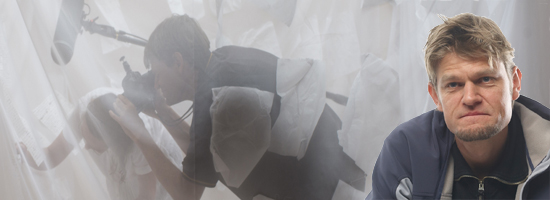
Christopher Robin Hopi Boomerang Chapman is his full name but he is normally called Hopi Chapman. We met Hopi on Facebook some years ago and later alive at the #RIO2016 Olympic Games. This Director of Photography, Filmmaker and Editor works in the South of Brazil at Flow Filmes. But his heritage is from Amsterdam, the Netherlands. He spoke very well english, so we invited him for our blog to listen to his adventures and projects in Brazil and elsewhere.
BB: How long have you been working in the TV business?
Hopi: Firstly I studied Cinema and TV at the University of Amsterdam. Then I worked as a trainee for a local TV station called Belissima TV, doing script, camera, directing and editing of short videos. Thereafter I worked two years for the Amsterdam TV station “AT5” as a cameraman for a sports program. As a freelancer I filmed and edited a lot of commercial videos, for the perfume chain Douglas but also a video about the national liberty day, and a music event in Amsterdam visited by fifty thousand people.
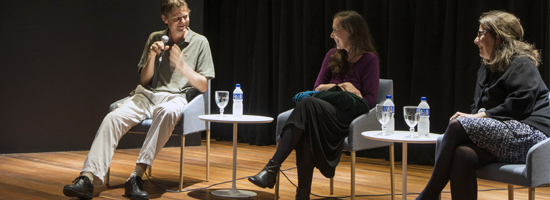
Hopi commenting a documentary at the screening 2014
I have been In Brazil since 1999. For one year I worked as a cameraman and editor for a fashion program and an extreme sports program. Then I worked for two years for an advertisement agency, making commercials, filming, editing and directing. Here I learned a lot about how advertisement works. I made a lot of political advertisements too, participating in six political campaigns as a cameraman and an editor. And I started to give editing lessons in Adobe premiere and After Effects. The last 7 years I made a lot of documentaries funded by the state and the Brazilian government.
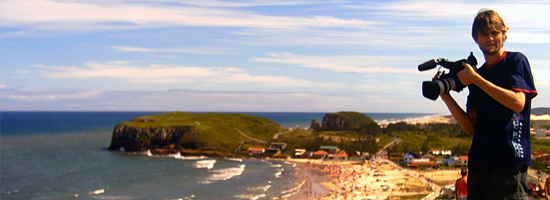
Making a film for an organization of bankworkers and their vacations in the south of Brazil, RS, SC, PR and SP
BB: Is communicating in the english language important for your job?
Hopi: Working in Brazil, mostly I do not use English although I did a few important jobs with Dutch and American people when English was fundamental to do the job. Speaking English is important in our business.
BB: On location at international events, is it difficult for you to talk with Brazilians ?
Hopi: It is not difficult for me to speak with Brazilians because I have lived for 19 years in Brazil. I speak Portuguese very well.
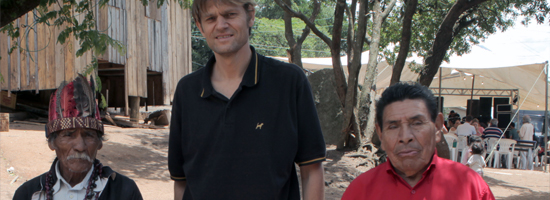
BB: Did you see a growth past years in international events in Brazil?
Hopi: Yes I saw a growth of international events like the Olympic Games and the FIFA World Cup soccer.
BB: What did this mean for your business?
Hopi: I worked on both events. During the World Cup I worked for a Dutch television company in Porto Alegre and the Olympic Games in Rio de Janeiro for Connecting Media who produced live webcasts for Facebook USA. It was great to be part of a crew that promotes these events to a lot of people.
BB: How was your job at the Olympic Games 2016 in Brazil?
Hopi: It was a nice job and great experience working together with Connecting Media for a company like Facebook and NBC. We had an international crew of Brazilian, American, Australian and Dutch crew members and it worked very well together.
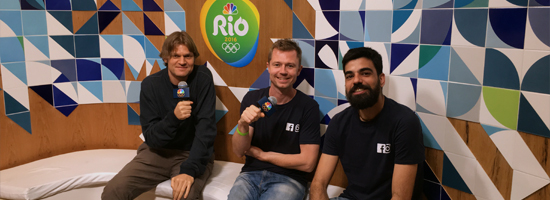
Camera for live webcast facebook at Olympic Games 2016 for ConnectingMedia
BB: Do you work besides Brazil also in other regions on the planet or do you have plans for that?
Hopi: I worked in a lot of places in Brazil, Uruguai, the Netherlands, Germany and Spain but for now I have no plans to work in other countries.
BB: Are there any surprising challenges you had at events past years?
Hopi: At the Olympic Games we had the challenge to transmit by Facebook interviews with atletes, comentators and special guests. And it went great. One challenge I have this year is making a tv series for TV Brasil and university tv channels, called Culturando. It is about young people of the periphery who work together in groups, creatively and productively.
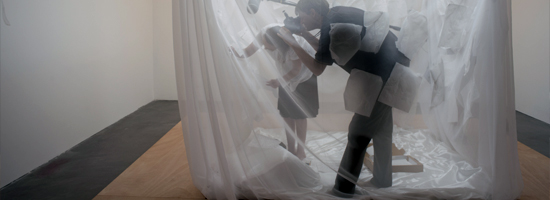
Filming and directing a documentary about the painter Karin Lambrecht
BB: You edit on Final Cut Pro. Do you still use it or did you update to Final Cut Pro X, Adobe Premiere, Davinci Resolve or AVID?
Hopi: I was only editing on Final Cut Pro for the last 10 years, but this year, after upgrading, my Mac did not accept it any more. I am using and Premiere CC a lot and I like it very much. It exceeded my expectations.
BB: Do you plan to learn other solutions, for example AfterEffects, Fusion or Apple Motion?
Hopi: I also use AfterEffects and give lessons in both After Effects and Premiere CC nowadays.
BB: Did you attended Exhibitions this year like SET EXPO, Church Expo, IBC or AES Brasil?
Hopi: This year I went to the Rio Content Market exhibition. It is a good opportunity to sell programs, documentaries and content to Brazilian and foreign TV Stations. There are people from all over the world.
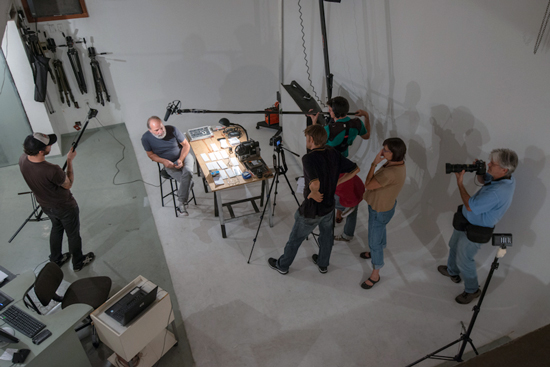
Directing and filming a documentary about a group of artists, called Nervo Óptico that is shown on channel Arte 1, TV//RS and TV Justiça
Productions made by Hopi Chapman - Flowfilms:
Kaingang Wisdom
This documentary (Full HD, 26 min, 2015) shows the lifes of two ninety-year-old kaingang Indians, one living in the city and the other in the countryside. (Produced by Flow Films)
Nervo Óptico, in search of a new eye (Trailer)
This documentary (Full HD, 26 min, 2013) shows that in Porto Alegre during the seventies a group of artists was thinking of art in a different way. The film is directed by Karine Emerich and Hopi Chapman. (Financed by the State Ministry of Culture and Pró-Cultura of Rio Grande do Sul)
Julio Plaza, the poetic and the political
This documentary shows the art of Julio Plaza. Directed by Hopi Chapman and Karine Emerich (26 min. Full HD, 2012)
Contact info
Hopi Chapman - Flowfilmes
Rua João Alfredo 312 cj. 616
90050-230
Porto Alegre/RS
Flow Films: Youtube - facebook - Flowfilms facebook page - Website
Like us if you want on Facebook, follow us on Twitter and Subscribe to our YouTube channel.
Brazilian TV in 2016 and in a near future
Brazilian TV in 2016 and in a near future
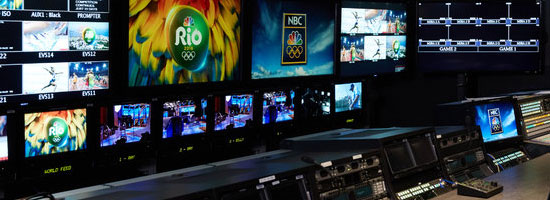
We are in the end of 2016 with a very interesting balance regarding the evolution in TV, especially in the case of public TV in Brazil. The changes of a new generation in the broadcasting business began with the switch-off. Begining with Rio Verde (GO) and the capital of Brazil (Brasília - DF) operating with the 100% digital signal, releasing the 700 MHz band for the implementation of 4G as well.
Another legacy that Brazil showed for the whole world was the Rio 2016 Olympics. Many investments were made in one of the biggest events in the world, thanks to television and Internet broadcasting capacity for billions of people.
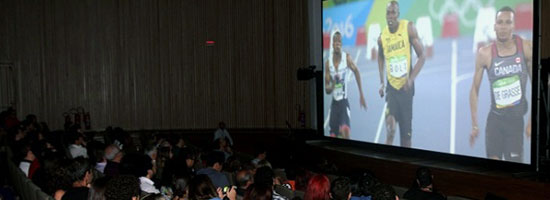
In this year, we were able to test the first transmission in 8K-UHD technology with an exhibition at Museu do Amanhã at Rio, between August 5 and 20, on a 300-inch screen, by optical fiber (uncompressed) and terrestrial (compressed). The signal was generated in 8K by the OBC (Olympic Broadcasting Services) in Jacarepaguá.
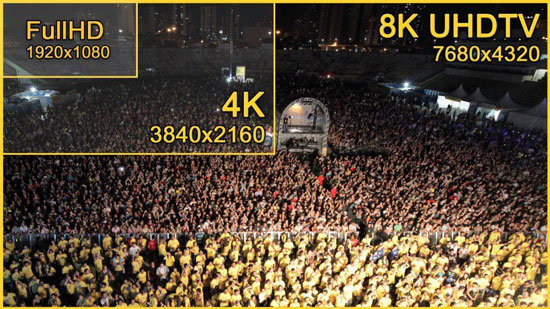
With the partnership of the Japanese broadcaster NHK (already targeting the Olympics in Tokyo by the year 2020) the signal was transmitted on channel 56 UHF (Center frequency of 754 MHz) directly from Mt. Sumaré on a transmitter of 660 W (H) + 660 W (V) in the standard ISDB-T, multiplex capacity of 36.72 Mbit/s, signal bit rate of 35 Mbit/s with HEVC 50 frames/s, 8 bit/px, with E-AC-3 5.1 as standard audio encoding.
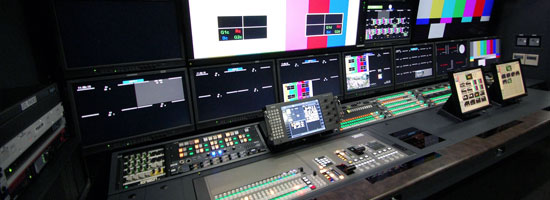
The power of TV in Brazil has shown, in an exemplary way, a surprising quality and use of new technology. One example is Grupo Globo that made 16 SporTV channels available in DTH and through the web with a historical coverage.
Even though we’re still on the road to Full-HD terrestrial broadcasting, 4K and 8K can show the ability to make the best way we watch content, through new experiences and future UHD standards with technologies such as High Dynamic Range (HDR) HEVC (High Efficiency Video Coding) and HFR (High Frame Rate).
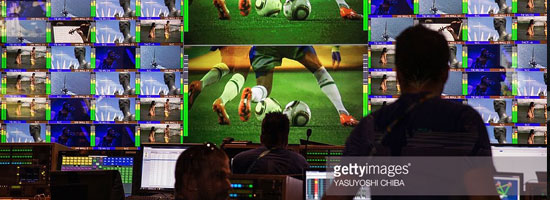
4K terrestrial transmission is already a reality in South Korea. In Japan, 8K transmission tests are in na advanced level. In Brazil, broadcasters are interested in the system, but they are concerned about the use of spectrum for Ultra HD transmissions.
So the broadcast market is also gaining, with the immersion of new technologies, with cameras of greater capacity, bigger and bigger televisions with more quality and functions, higher signal processing, and it is worth noting a special highlight for the audio with 22.2 channels, making the experience more immersive and as close to reality as possible.
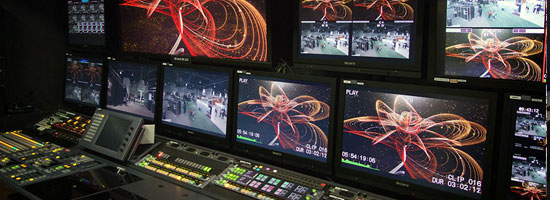
Watching television will become a differentiated experience of what we are used to know, whether via optical fiber, terrestrial or satellite. It is worth mentioning that the film industry also already uses 4K system in its productions and this integration with television extrapolates the business, being materialized in the technology. Very soon, we can say that there will be no difference between the production for TV and Cinema, in technological aspects. So it is possible to say that in a brief future we will be in an entertainment universe with incredible dimensions and possibilities.
Like us if you want on Facebook, and follow us on Twitter
UPDATE september 29th 2017: Brazil speeds up DTT STB delivery ahead of Rio switch-off
Tags: Brazilian TV, 2016, switch-off, Rio 2016, Olympics, 4K, 8K, Tokyo 2020, broadcasting, Ultra HD, future.
In this video you can view some #BehindTheScenes brought to you by panasonic:
We would like to thank Marcel Almeida for writing for us.
More info you can find on his LinkedIn: br.linkedin.com/in/marcelmg77/en or follow him on Twitter @marcelmg77
Like us if you want on Facebook, follow us on Twitter and Subscribe to our YouTube channel.
mentioned:
Rio 2016 : Website - facebook - Twitter - YouTube
Tokyo 2020 : Website - facebook - Twitter - YouTube
NHK : Website
OBC : Website
TV Globo/SporTV : Website - facebook - Twitter - Videos
Rodolfo Souto , being a tech guy at TV Globo
Rodolfo , being a tech guy at TV Globo
We met Rodolfo Souto some years ago at the Formula 1 at Interlagos, São Paulo. He was responsible for some cabling between the international Broadcasters and the Host TV Globo. In their booth at the TV compound we found Rodolfo with his head in a rack. There was a ‘small problem’ in which he had to solve’ he said. The next morning we spoke to him again, he told us he re-cabled the whole rack overnight to solve the problem. A Die-Hard technician this Rodolfo. And…. he spoke very good english. so we invited him for our blog.
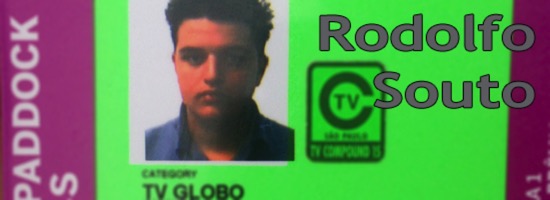
BB: Can you tell us about yourself and your job at - External events São Paulo?
Rodolfo: My Name is Rodolfo, and I`m a Technician of TV System. I am working for TV Globo since December 2006, almost 10 years now.
BB: Tell us about the company TV Globo - External events São Paulo and how long does TV Globo - External events São Paulo exist?
Rodolfo: The External team of Events in São Paulo exists since 1975 i think. The first soccer game that the External events team broadcasted was with only 3 cameras, the signal output were a Analog MicroWave route between the Soccer-Stadium and TV Globo in São Paulo. The guys that worked on that production time are still very proud of what they achieved those days.
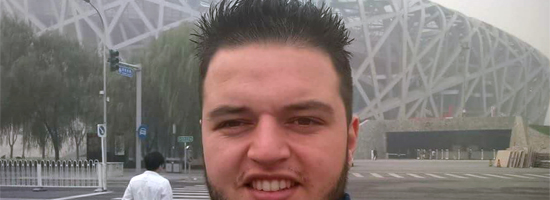
BB: Did you see a growth past years in working at international events for you in Brazil?
Rodolfo: Yes a lot. I Worked at productions like the Confederations Cup, the World Cup in 2014 and this year i will be at the Olympic Games in Rio de Janeiro. Aldo, i worked on the last 5 Formula 1 GrandPrix’s at Interloagos in Brazil.
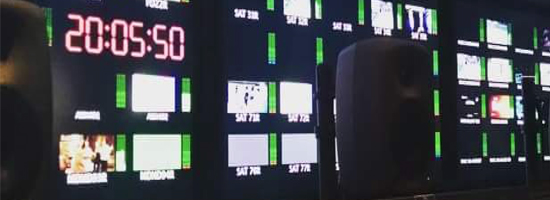
Our OBvan at TV Globo is one of the top of Latin America. I can see that after all this years Broadcast production are getting bigger and harder to achieve in the technical sense. I like that, it makes me feel good when i am working on an International Event, meeting colleagues from all over the planet and being able to talk with them.
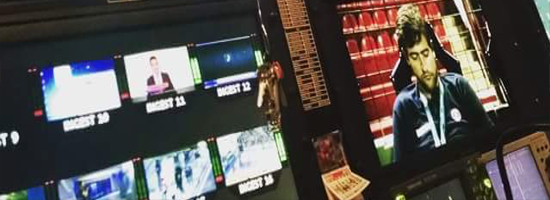
BB: What this growth ment for you and your colleagues at TV Globo - External events?
Rodolfo: TV Globo has 5 department: Rio de Janeiro, São Paulo, Belo Horizonte, Brasilia and Recife. When we have something new coming for us, normally it starts in Rio and São Paulo. So we get a lot of time to learn and understand the new technology, equipment and solutions. This is very well arranged at TV Globo.
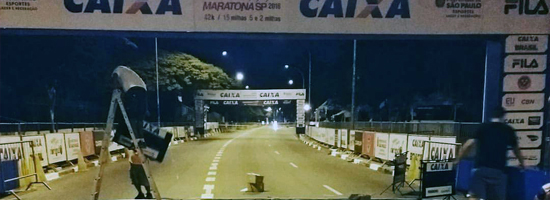
BB: Do you work besides Brazil also in other regions on the planet?
Rodolfo: Yes i did. In 2014 i went to China and also Singapore. The Brazilian national team played 2 friendly games over there. I spent even 12 days on this location job. It was amazing meet the other side of the world. In 2015 i went to Colombia to broadcast a Corinthians`s game at the Libertadores championship. That was awesome too. Speaking English is very important on International events. It was because of the english that i got this opportunity to go to China and Singapore. Knowing the english language did give me this opportunity.
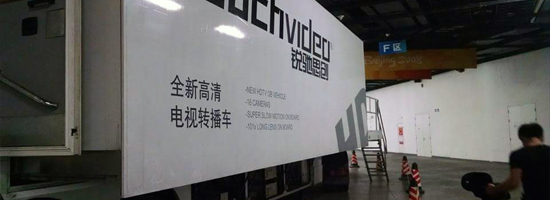
BB: On location at international events, is it difficult for you to communicate with Europeans, Americans, Australians or LATAM countries?
Rodolfo: Yes, with the LATAM’s i try to speak in Spanish but especialy with the Argentines it is hard. They speak to fast. With the Europeans it is alright, they speak very well english. It is only boring for me when they speak their own language. I do not understand anything they speak than. I worked with Australians at the World Cup in Sao Paulo, that was ok too. At the Formula 1 i speak a lot with the British guys. For me it is kind hard, to understand them. It is because i studied American English, so it is hard to get used to understand their they speak english, but in the second day everything goes already better. Every time you learn.
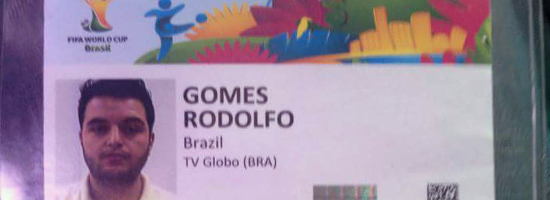
BB: How do you see your job due to Olympic Games 2016 in Brazil?
Rodolfo: It will be awesome for sure. We will never see an event like this in Brazil soon again. I am very excited to be part of this event. I will be working at Arena Corinthians in São Paulo working for the OBS. It will be unique experience, my expectation are the best you can imagine.
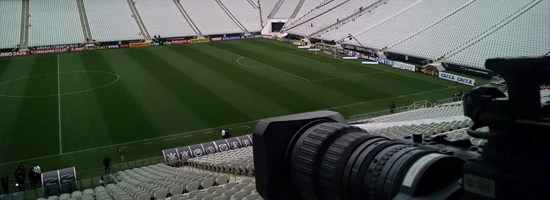
BB: Is there any surprising challenges you had at events past years?
Rodolfo: No, not really. We always have something new popping up every day in this kind of job. After some years i got used to all types of bad and good surprises. The challenges make us better and stronger. Things that i learned on International events i carry with me at every other production i do, in Brazil and abrought.
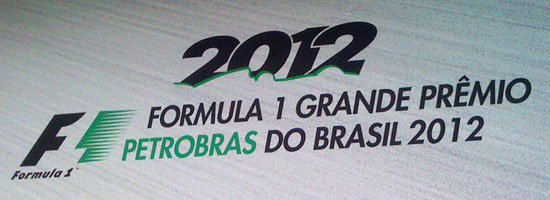
BB: What surprising challenges you think you will have at the Olympics this year?
Rodolfo: I think that we will have all the possible surprises thinkable. We will be the Host Broadcaster at the Olympic Games. All the broadcasters in the world will come to us to ask for some signals or assistance. A lot to solve and help fur sure.
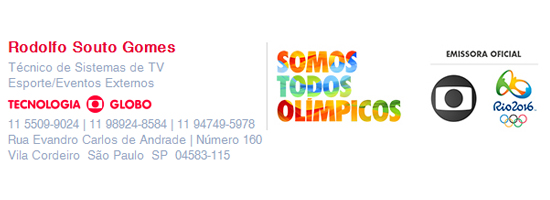
Video Olympic Games (Official Theme) - Rio 2016:
Like us if you want on Facebook, follow us on Twitter and Subscribe to our YouTube channel.
mentioned:
Globo TV: website
Encoder testing in Rio de Janeiro for 2016 Olympic Games
Smart-telecaster Zao H.265 encoder testing in Rio de Janeiro for 2016 Olympic Games
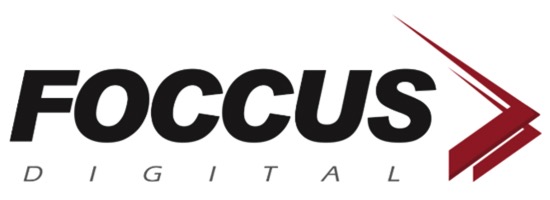
BB: Can you tell us your name and function at Foccus Digital:
Robert: My name is Robert Houghtaling, working at department Business Development. I am responsible for marketing, effectively managing innovation, new industry solutions and supporting strategic partnerships. I work at Foccus Digital for 1,5 years now.
BB: Tell us about the company Foccus Digital.
Robert: Foccus Digital founded in 2006 is a systems integration firm that provides complete infrastructure for the processing and transmission of IP signals in the broadcast industry. Foccus offers a renowned portfolio of partners integrating hardware, software and services to ensure complete operability of an end-to-end solution. Our post sales and service areas are an integral part of our commitment to supporting clients and ensuring functionality for the life of the equipment. Foccus Digital additionally provides expertise and consistency in the logistical import processes aligned with the requirements of Brazil and Latin America. Foccus Digital is already 10 years doing business in Brazil and for 4 years also in Latin America.

BB: Did you see a growth in audio/video related products in 2015 for Foccus Digital in South America/Brazil.
Robert: We continue to see increasing growth in the integration of networks defined by software and IP. Foccus digital concentrates on emerging technologies and the solutions necessary to manage baseband and IP both intelligently and efficiently. Brazil also has an increasing need for microwave radio links and mobile encoders for live streaming over 3G, 4G / LTE / WiFi.
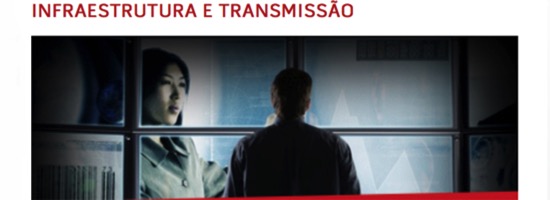
BB: You attended this years SET EXPO, what do you think about this exhibition, and are you planning to attend more Brazilian Exhibitions next year, Like the Church Expo for example.
Robert: The SET Expo is an excellent event for learning about new industry-leading solutions and networking. We had an a great turnout. We have additionally participated in the Church Tech Expo in 2015 to market our portfolio to this niche market.

BB: Do you work besides the south america region also in other regions on the planet.
Robert: As a systems integrator we are often able to collaborate on a variety of projects in South America. Our US based company Palma International Technology integrates projects throughout Latin America and serves as the distributor of Belden cables and connectors for the entire region.
BB: Is communicating in the english language important at Foccus Digital for Brazillian co-workers
Robert: Foccus has long standing partnerships with several American and European companies including Aviat Networks, Belden, Imagine Communications, Gates Air, Cobham, Riedel and Spinner. The technology and training resources developed by these partners is generally all presented in English. In addition, we recently became the Latin American distributer for Soliton a Japanese based company. This partnership developed with English is our unifying language.
BB: Are you or planning too partnering with Brazilian companies.
Robert: We coordinate with the regional offices of each of our partners.To date we have only represented international brands, but we are always on the lookout for new interesting technology both nationally and internationally.
BB: Which section in the audio/video market is the strongest for Foccus Digital in Brazil.
Robert: Brazilian broadcasters are actively seeking solutions for mobile encoders enabling transmission of high quality real-time video even in challenging localities with extremely limited bandwidth. Broadcasters require the ability to transmit essential events with high quality digital video and stability, even under network congestion or weak network signals. Foccus Digital is integrating the Smart-telecaster Zao, the world’s first H.265 mobile encoder ideally designed for mobile streaming, live sports and live journalism applications. This market continues to grow as and we are finding the H.265 encoder is an excellent robust solution for live sports and live journalism applications.

BB: How do you see the broadcast market in 2015 due to Olympic Games in Brazil
Robert: We foresee a number of planning opportunities for event infrastructure, A/V event and rental services associated with the 2016 Olympics Games. Foccus and Soliton have confirmed on-site support and rental of the Smart-telecaster Zao for Brazilian and foreign broadcasters who will require high-quality transmission solutions.
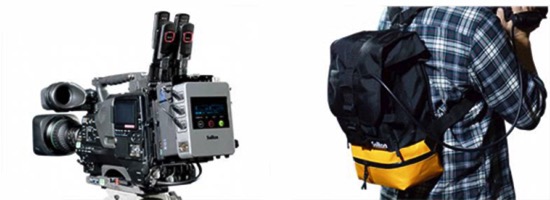
Our partner Cobham offers the most robust COFDM link in the world. We have been offering demonstrations and highlighting Cobham solutions including the SOLO HD 7 Nano is the world’s smallest COFDM digital transmitter. The Nano is characterized by a lightweight design, low power consumption and HD video quality ideally utilized in drones, enabling high-performance HD broadcast events and aerial filming. We are targeting our portfolio to offer solutions for the large variety of events at the Olympic Games. Foccus Digital will be on-site providing technical support, sales and leasing options in Brazil.
BB: You have done a test with the Smart-telecaster Zao H.265 encoder in Rio de Janeiro, a Live transmission in the historic Igreja Matriz in Santana de Parnaiba , can you tell us more about it…. what makes it so special.
Robert: The Soliton Smart Telecaster Zao is the world’s first H.265 mobile encoder that provides a live broadcasting link anywhere there is a connection. Zao allows broadcasters to get to locations quickly and transmit high quality video and audio via 3G/LTE/Wi-Fi networks. The H.265/HEVC video compression standard ensures efficient and robust transmission even in localities with extremely limited bandwidth. The preliminarily tests in Rio confirmed that transmission in full HD can be achieved in all areas of the city.
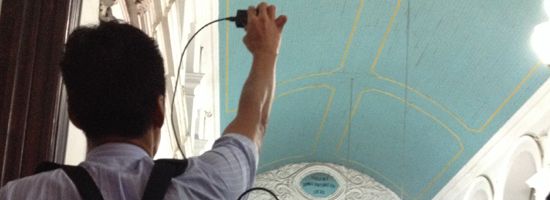
BB: Is the Smart-Telecaster prepared for mobile networks in Brazil.
Robert: The Smart-telecaster is offering a excellent solution for Brazilian broadcasters many who have experienced issues with H.264 equipment in low bandwidth areas. By connecting up to 6 mobile modems and utilizing the H.265/HEVC standard, video can be compressed to a file that is about half the bit rate of its predecessor AVC. The result is video compression twice as efficient as AVC and a significantly improved image quality of full HD at a low bit rate. We have tested throughout Brazil with all mobile operators with exceptional results.
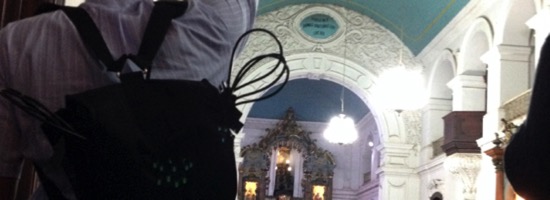
BB: What can you tell us about the H265/HVEC licensing fees that some want to introduce for the use of the H265/HEVC codec And will this also influence future use and users of the Smart-Telecaster.
Robert: We are following closely the developments related to the licensing fees and we will continue to monitor how this could play a role in H.265/HEVC. As of now, Zao does not have any issues related to licensing and be utilized by all broadcasters.

BB: Any surprising challenges you had or think you will have or had in the Rio de Janeiro test with the Smart-Telecaster in Brazil.
Robert: Zao was exceptionally stable and reliable during our tests in Rio de Janeiro. The robustness of the equipment and lightweight design will allow broadcasters to get to and transmit the essential Olympic events quicker and easier. Test were performed at sites including Maracanã and Engenhão Stadiums, Olympic Park, Marina da Gloria, Christ the Redeemer, and the Sambodromo. Zao transmitted flawlessly in full HD in all localities utilizing a variety of modems and the 3G/4G chips of the major Brazilian mobile operators.
Video Rio 2016 Olympics Smart-telecaster Zao:
Like us if you want on Facebook, follow us on Twitter and Subscribe to our YouTube channel.
mentioned:
Foccus Digital : Website
Soliton : Website - YouTube
Aviat Networks : Website - Facebook - Twitter - YouTube
Belden : Website - Twitter - YouTube
Imagine Communications : Website - Twitter - YouTube
Gates Air : Website - Facebook - Twitter - YouTube
Cobham : Website - Twitter - YouTube
Riedel : Website - Facebook - Twitter - YouTube
Spinner : Website - Facebook - Twitter - YouTube
On Screen Talent for 2016 Olympic & Paralympic Games
On Screen Talent for 2016 Olympic & Paralympic Games
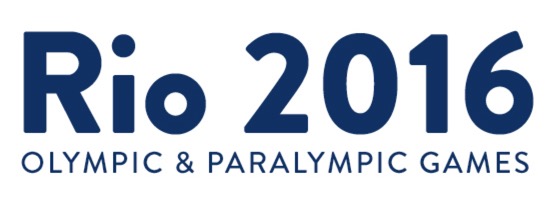
This week we got an email from DreamJobbing. They first ask us to add them to our members list, after we read all info and the ‘about’ section on their website we thought this can be an opportunity besides our members for all our readers. So we made it into a small blog entry. What is it all about? DreamJobbing are currently looking for applicants interested in being On-Screen Talent at the 2016 Rio Olympic and Paralympic Games.
Their website explains it like this:
You could be doing interviews with athletes, spectators and even celebrities live to the big screen in the Rio 2016 Olympic and Paralympic competition venues. 33 competition venues for the Olympics and 20 for the Paralympics will be spread across four regions of the city – Deodoro, Maracana, Barra and Copacabana. If you think you have what it takes to present live in both English and Portuguese, the ability to quickly translate between the two languages, are fearless but most of all want to be a part of the biggest sporting event on planet earth, then you are the perfect person for one of these incredible DreamJobs. Depending on the applicants' location (international or local), some candidates will be flown to Rio. All candidates will receive accommodation. To be chosen simply upload your one minute creative video, explain what makes you the perfect candidate in both English and Portuguese, and show us your passion for the Olympics and Paralympics. Remember, be creative, be fearless and have fun. See you at Rio 2016!
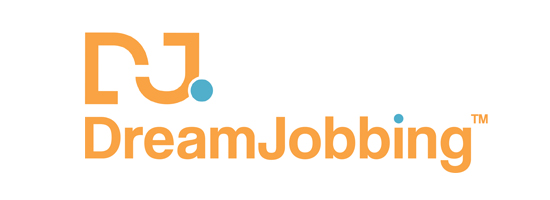
Candidate Requirements:
Eighteen years or older (18+)
Bilingual (able to speak English and Portuguese)
Video on-Screen talent: Rio 2016 Olympics & Paralympics:
Broadcast Brazil promotes the need for Brazilian Audio Visuals and Journalists to study English to get better job opportunities. So, this job entails interviewing athletes in both English and Portuguese.
To apply for the job, you need to submit a 1 minute video to this website: Dreamjobs Rio2016
Like us if you want on Facebook, follow us on Twitter and Subscribe to our YouTube channel.
mentioned:
DreamJobbing : Website - Facebook - Twitter - YouTube